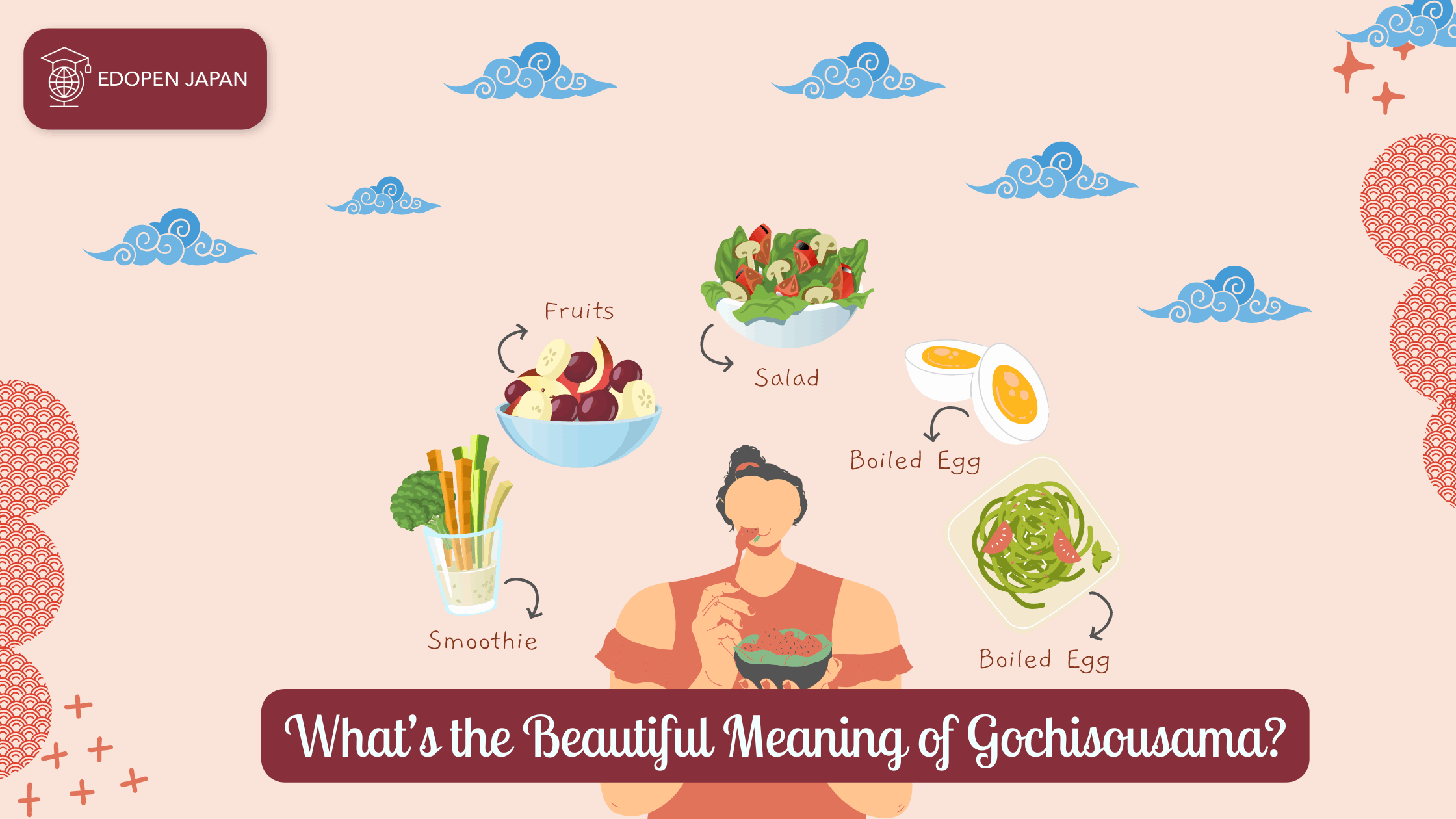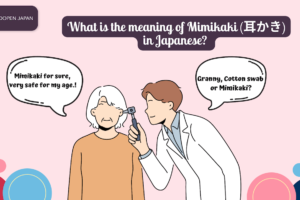Hi! When you watch J-Drama or Anime, have you ever heard the phrase “Gochisousama”? Or when you read basic Japanese sayings, have you ever come across the word “Gochisousama”?
Yes, Gochisousama is often said by many Japanese people after finishing a meal. This phrase is a must when learning basic Japanese. Do you know what it means? Let’s learn it together. Gochisousama is not just an ordinary phrase to say after eating. It has a very deep meaning. Please read our detailed explanation below!
In addition, for those of you who really love Japanese snacks, we have a special recommendation for one of the best websites that you can visit to find out details about the best choices of Japanese snacks: The Japanese Snacks Lab.
This website provides very detailed, updated information and was built specifically by a student at one of the best universities in Tokyo with a very heartwarming vision “Making the World Smile with Japanese Snacks!”. The articles provided are very suitable for those of you who are confused about choosing Japanese snacks.
Furthermore, the author provides very thorough information regarding recommendations for various typical snacks in Japan, starting from the best vegan snacks, best healthy snacks, best chocolate snacks, best soybean snacks, best nori snacks, best crabs snacks, the newest ones even recommendations for the best halal snacks and many more.
Surely, you will get a deep and comprehensive guide regarding snacks in Japan by reading the discussion from the author, who also has an official Level 3 dietary advisor certificate. Visit the following link to read the latest article presented by the Japanese snacks lab!
Read also:
What is the meaning of “Nomikai” in Japanese?
13 Correct Ways to Say Delicious in Japanese
The Basic Japanese Greetings
Contents
Defining the word “ご馳走様 (Gochisousama)”
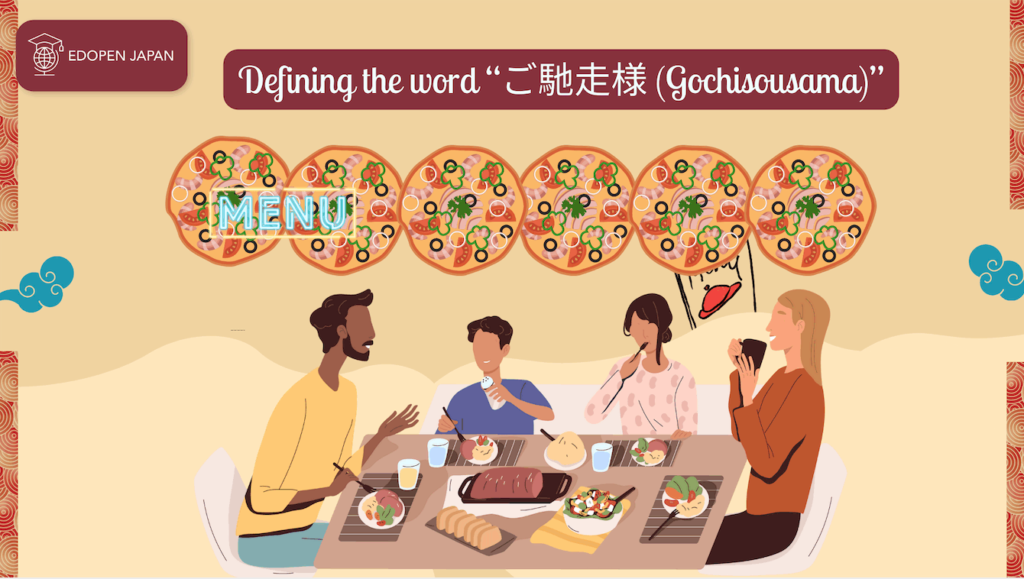
First, let’s talk about definitions. The Japanese use the phrase Gochisousama after eating. This greeting expresses deep gratitude for eating etiquette in Japanese culture. A long time ago, it is said that Japanese people had to run to serve their food.
They had to hunt, fish, and harvest with all their efforts to get food. The phrase Gochisousama is an expression of deep appreciation to those who have done great work to present the food. Nowadays, this greeting is addressed to all parties involved in presenting the food that people have eaten.
In English, Gochisousama means “Thank you for the wonderful meal. Similarly, the other most common phrase is Gochisousama deshita, which means “Thank you for the wonderful meal, it was plentiful and festive.
“ご馳走様 (Gochisousama)” in Hiragana
Second, would you like to try writing the phrase Gochisousama in hiragana? Here is the way! Gochisousama is made up of the following hiragana characters:
- ご (go)
- ち (chi)
- そ (so)
- う (u) do not forget to put this letter
- さ (sa)
- ま (ma)
Therefore, the Hiragana for Gochisousama is ごちそうさま.
Also, please note that you can write this phrase in Romaji as Gochisousama or Gochisōsama. Both have the same meaning.
“ご馳走様 (Gochisousama)” in Kanji
Not only knowing the hiragana, but also learning the kanji is really important, I think. It is also very important to know the meaning of the phrase Gochisousama from its kanji. The kanji of Gochisousama is ご馳走様 (Go Chisou Sama). Let’s break down the meaning of each character as follows:
- (1)ご or 御 (go) is an expression of respect (honorific prefix O or Go).
- (2)馳走 (Chisou) originally from the phrase 「馬で走り回る (uma de hashirimawaru)」means to run around on a horse.
In the ancient past, people had to ride horses and hunt for ingredients to prepare food. It took a lot of effort to select and threaten the ingredients to prepare hospitality dishes. Unlike today, we can easily buy ingredients in stores. The Kanji ご馳走様 (Gochisousama) shows deep appreciation, respect, and gratitude for the efforts of these people.
The origin usage of “ご馳走様 (Gochisousama)”
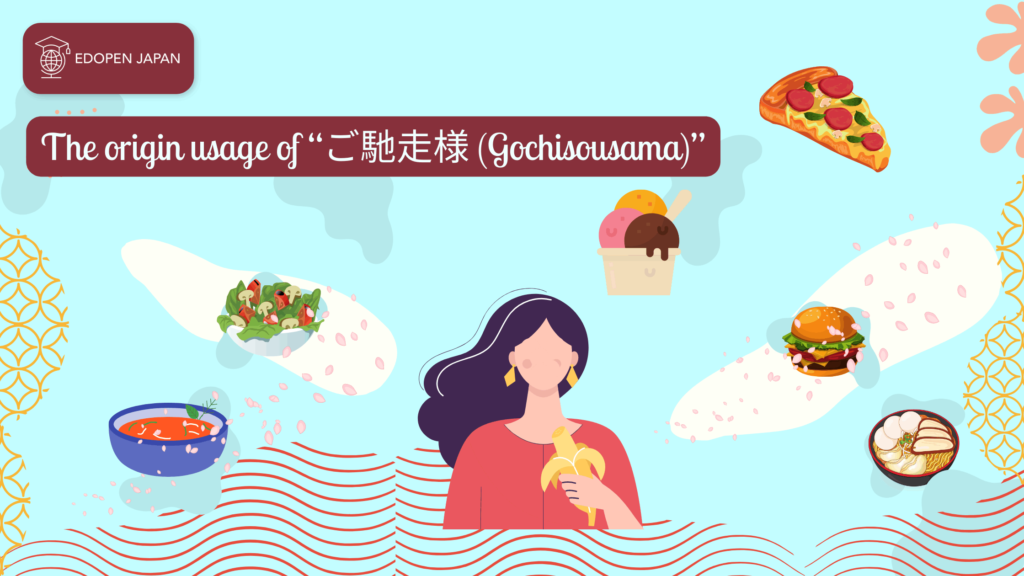
According to various sources, the phrase Gochisousama began to be used as a greeting after meals in the latter half of the Edo period. It was during this period that the basic modern Japanese food cultures were formed. What kind of cultures?
They were the establishment of the three-meals-a-day eating style, the birth of gourmet food (sushi, tempura, and soba), and the development of eating out culture (eating in restaurants and izakaya) as well as custom foods.
The beautiful meaning in “ご馳走様 (Gochisousama)”
As I said before, the kanji of Gochisousama have a very beautiful meaning. It represents appreciation and respect for the people who rode horses and worked hard to prepare food. It is the same today.
Even though it is not as difficult to get ingredients as in the past, there are still people who run to go shopping. Also, there are still people who run to the store to arrange the ingredients, and people who run to cook. Therefore, this phrase shows gratitude to everyone who works hard for a single meal.
When you say it after eating, please say it out loud with your heart. It is not just a “thank you” for the meal, but beyond just filling your stomach. It is an appreciation, a deep gratitude, and a thank you to everyone who worked for your meal on the table.
How to pronounce “ご馳走様 (Gochisousama)” in Japanese
Do you want to practice how to pronounce Gochisousama or Gochisousama deshita? Here are the best exercises for you! Please listen to the audio below and try to say it as many times as you like. Then you would not get slip of the tongue or misspelling when you say it practically.
(1) Gochisousama.
(2) Gochisousama deshita.
“いただきます (Itadakimasu)” & “ご馳走様 (Gochisousama)”
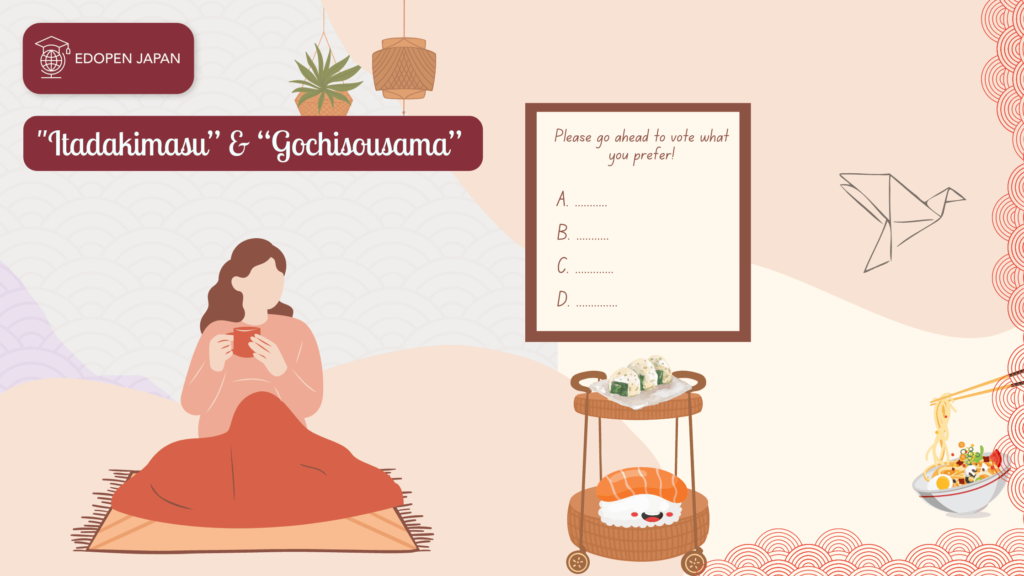
As you may have heard, these 2 phrases are very popular when eating food in Japanese anime, do you know the meaning? Itadakimasu is technically a kenjougo or humble phrase in Japanese.
People say Itadakimasu before eating by putting their hands together and bowing. It means to receive (humbly). A similar phrase with a more casual meaning is moraimasu. However, we cannot change itadakimasu with moraimasu. Before eating, you can only say itadakimasu, not moraimasu, no matter what.
Then, Gochisousama is a couplet of Itadakimasu. People say Gochisousama after eating. When people say it, they join their hands and bow at the same time. You can also say Gochisousama deshita, which means “Thank you for a wonderful meal, it was a great feast. The phrase deshita indicates the past tense, since you have finished eating.
When you say “いただきます (Itadakimasu)” and “ご馳走様 (Gochisousama)”?
Some people may have trouble when they join Japanese dining for the first time. Most of them would need detailed table manners, especially when are the perfect times to say Itadakimasu and Gochisousama.
Also, do not forget to bring your palms together when you say these two phrases. Here are the detailed instructions for you!
When saying Itadakimasu:
- Japanese people say Itadakimasu wherever they eat, whether in a restaurant or at home.
- If someone cooks for them, the Japanese would surely say Itadakimasu in gratitude for their kindness.
- We can use itadakimasu when we receive a gift. This is a formal way to say thank you.
When saying Gochisousama:
- After you finish eating, whether you are eating in your own home or someone else’s home.
- When you finish eating at a restaurant. Servers and chefs would be very happy to hear you present them with Gochisousama deshita after you finish the meal they prepared for you.
- If your friend, colleague, or anyone who has treated you to a meal or drink. Saying Gochisousama deshita would be the best way to thank and appreciate their kindness to you.
Learning other phrase: “ゴチになります (Gochi ni narimasu)”
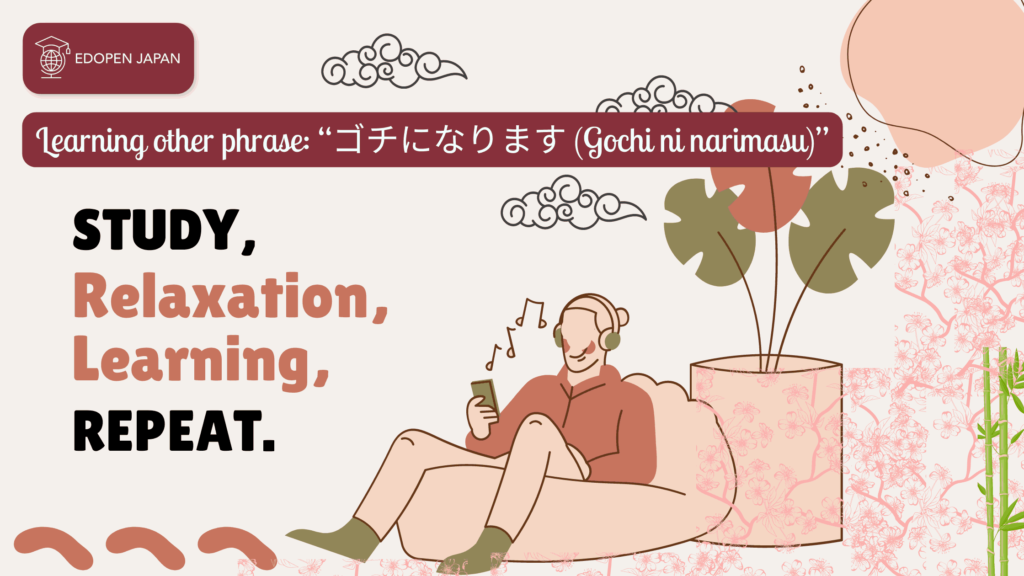
Recently, people have come to use the phrase “Gochi(ゴチ). This is a shortened form of the phrase Gochisousama. This phrase has been widely used as slang or colloquial language by young people or some adults.
In Japan, this phrase was originally a word that came from a project in a television program. Through this program, Gochi ni narimasu (ゴチになりま) became popular and spread all over Japan. It means “Thank you for the delicious food.
“ご馳走様でした (Gochisousama deshita)”
Gochisousama deshita literally means “to run around” or “to make every effort for the guest. We can break down each word as follows:
- Gochisou means luxurious food or a feast.
- ~sama is an honorific phrase called Keigo to respect the word or person.
- ~deshita means It was. This phrase is the past form of the word desu.
In short, “ご馳走様でした (Gochisousamadeshita)” means “Thank you for the food, it was a feast.
“御馳走様 (Gochisousama)” in JLPT
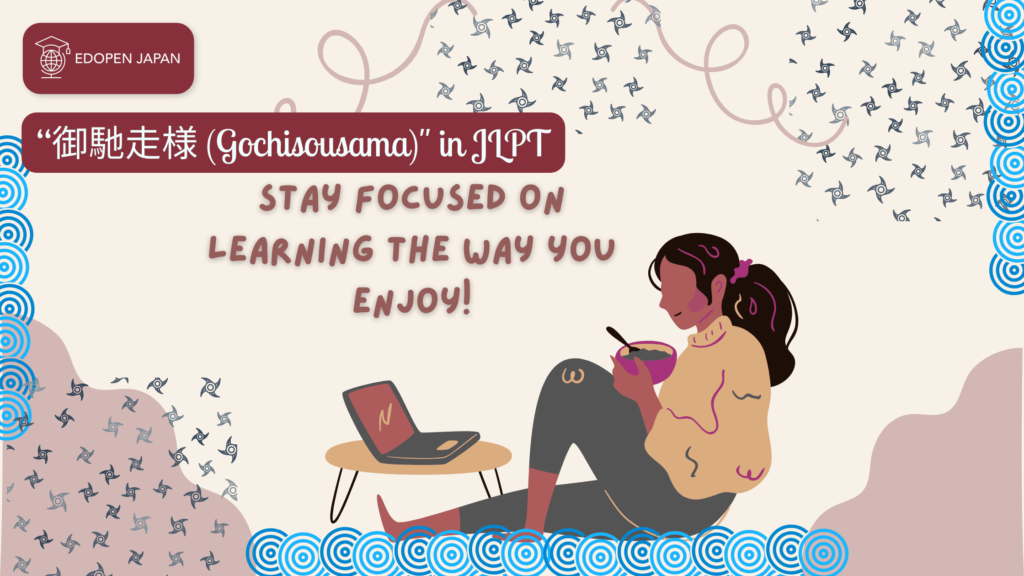
The phrase “御馳走様 (Gochisousama)” consists of 4 Kanji 御馳走様. According to several sources, this sentence belongs to JLPT N2. To know each kanji level, let’s break it down as follows:
- 御 Go : JLPT N3
- 馳 Chi : Unidentified
- 走 Sou: JLPT N4
- 様 sama: JLPT N3
Therefore, based on the kanji, it can be concluded that the word “ご馳走様 (Gochisousama)” belongs to JLPT N4 or N3.
“ご馳走〜 (Gochisō~)” meaning in Japanese
Next, have you ever heard the phrase Gochisō~? The phrase Gochisō~ is a shortened phrase from Gochisousama. It means the feast. Originally the kanji Gochisō~ means to run around for preparing the food. You can use this as a more casual phrase. When you eat with your friend, using this would be nice.
How to reply to the phrase “ご馳走様 (Gochisousama)”?
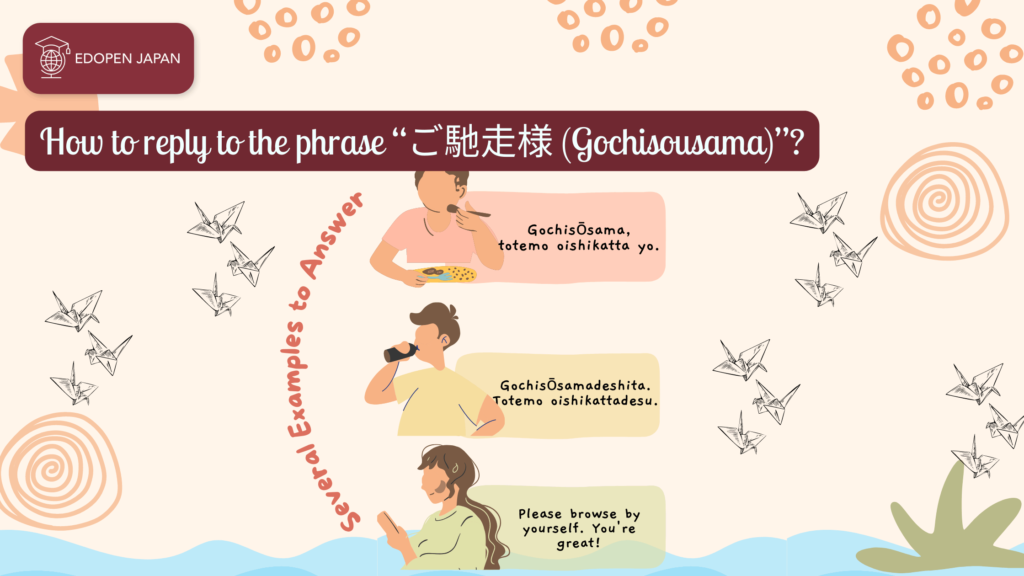
After reading all this about goshisosama and goshisosama deshita, you may want to know what the response would be from the chef or people who prepared the food for you.
The answer you would get would be “Douzo mehiagare,” which means “Please enjoy (the food). Isn’t that nice?
The example sentences with “ご馳走様 (Gochisousama)”
To make your Japanese sound very nice and polite. You can add the following phrase when saying Gochisousama. Choose what you like!
| (Less Formal) ごちそうさま、とても美味しかったよ。 Thank you for the meal. |
| (Polite form) ごちそうさまでした。とても美味しかったです。 Thank you for the meal. (The food) was very delicious. |
Please play the audio below to hear how to pronounce the sentences above!
(1). ごちそうさま、とても美味しかったよ。
Gochisōsama, totemo oishikatta yo.
(2). ごちそうさまでした。とても美味しかったです。
Gochisōsamadeshita. Totemo oishikattadesu.
Similar word with Gochisousama
There are actually 3 ways to say “Thank you for the food” in Japanese. All 3 expressions below have the same meaning. They are:
- “Gochisousama(ごちそうさま)“: this phrase is short and neutral.
- “Gochisousamadeshita(ごちそうさまでした)”: this phrase is very polite.
- “Gochisousan(ごちそうさん)”: this phrase is more casual.
Conclusion
Last but not least, coupled with the explanation above, we can conclude this article with the following points:
- The phrase “ご馳走様 (Gochisousama)” is an expression of deep appreciation to those who have done great work to present the food.
- The Kanji “御馳走様 (Gochisousama)” shows deep appreciation as well as respect and gratitude for the efforts of the people who prepare the food.
- “いただきます (Itadakimasu) and ご馳走様 (Gochisousama)” is a pair expression of table manners in Japanese. People say Itadakimasu before eating and Gochisousama after eating.
- Learning about “御馳走様 (Gochisousama)” deeply expands and sharpens our understanding of the Japanese language and its beauty in respecting creatures in this world, especially food and people.

